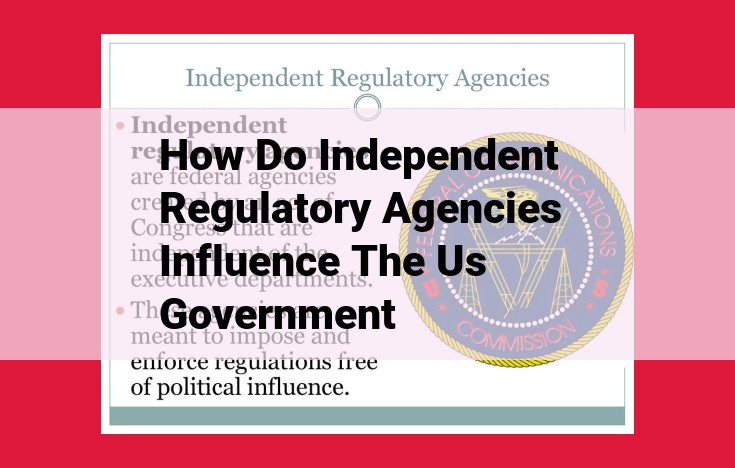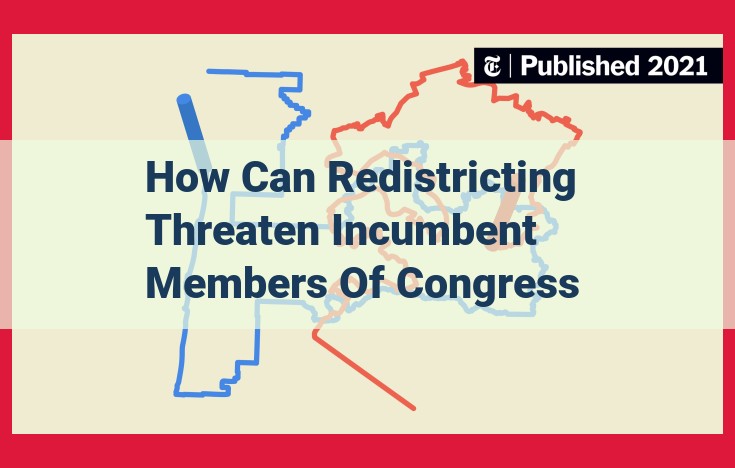Independent Regulatory Agencies (IRAs) play a vital role in the US government by regulating specific industries and protecting consumers. They operate independently, but influence the government through rulemaking, enforcement actions, and policy recommendations. IRAs ensure fair competition, protect the environment, promote consumer safety, and regulate financial markets, shaping outcomes in their respective domains.
Independent Regulatory Agencies: Guardians of the Nation’s Well-being
In the ever-evolving tapestry of government, there exists a crucial thread that runs through various industries and sectors, ensuring the safety, fairness, and progress of our nation. These entities are known as independent regulatory agencies (IRAs)—watchdogs tasked with safeguarding the public interest from powerful entities and industries.
IRAs play a pivotal role in the United States’ regulatory landscape. They are independent of the day-to-day political whims and pressures, enabling them to make decisions based on evidence, expertise, and the law. This autonomy allows IRAs to act as unbiased arbiters, ensuring that the interests of the public are prioritized above those of any particular group or entity.
The scope of IRAs is vast, encompassing a wide array of areas that touch the lives of every American. From regulating the markets that trade our food and energy to protecting our environment and health, IRAs are the unsung heroes working tirelessly behind the scenes to keep our country safe, healthy, and prosperous.
Commodity Futures Trading Commission (CFTC)
- Mission and responsibilities of the CFTC
- Regulation of commodity futures and options markets
Commodity Futures Trading Commission: Guardians of the Futures Marketplace
In the realm of trading, where the future is as volatile as the present, the Commodity Futures Trading Commission (CFTC) stands as a vigilant guardian. Established in 1974, this independent regulatory agency holds a critical role in ensuring the integrity and transparency of commodity futures and options markets.
Mission and Responsibilities
The CFTC’s mission is multifaceted: to protect market participants, prevent market manipulation, and ensure the fair and orderly conduct of futures and options markets. It achieves this by:
- Overseeing the trading of various commodities, including agricultural products, metals, and energy.
- Regulating futures exchanges and intermediaries, such as brokers and clearinghouses.
- Enforcing rules against fraud, manipulation, and insider trading.
- Promoting transparency and disclosure in market information.
Regulation of Futures and Options Markets
The CFTC’s regulatory powers extend across a wide range of activities within futures and options markets:
- Market Surveillance: It monitors trading activities to detect and mitigate potential risks.
- Registration and Licensing: The CFTC licenses brokers, traders, and other market participants to ensure compliance with regulations.
- Enforcement Actions: The agency investigates and prosecutes violations of its rules, including manipulation, fraud, and misrepresentation.
- Rulemaking: The CFTC develops and implements rules to govern market practices and protect market participants.
By fulfilling these functions, the CFTC fosters confidence in the futures markets, allowing investors to participate in these markets with assurance of safety and fairness.
The Consumer Financial Protection Bureau: A Watchdog for Consumers
In the aftermath of the 2008 financial crisis, the need for stronger consumer protection measures in the financial sector became undeniable. Enter the Consumer Financial Protection Bureau (CFPB), an independent agency tasked with ensuring the fair, transparent, and accountable behavior of financial institutions.
The CFPB was established in 2010 as part of the Dodd-Frank Wall Street Reform and Consumer Protection Act. It operates autonomously, with a single director appointed by the President. Its mandate is straightforward: protect consumers from unfair, deceptive, or abusive financial practices.
Since its inception, the CFPB has taken on a pivotal role in safeguarding consumer rights. It has successfully pursued enforcement actions against financial institutions that have violated the law, resulting in billions of dollars in refunds and penalties. Among its notable accomplishments include:
- Mortgage servicing: Addressing predatory lending practices, the CFPB has taken action against lenders for illegal foreclosures and mortgage servicing abuses.
- Credit cards: The CFPB has cracked down on deceptive credit card practices, including hidden fees and unfair terms.
- Student loans: The agency has helped millions of student loan borrowers by providing relief from predatory loan servicer practices.
The CFPB’s consumer protection measures extend beyond enforcement actions. It also issues regulations to prevent harmful practices, provides financial education to empower consumers, and maintains a complaint database to identify and address industry-wide issues.
Through its unwavering commitment to consumer protection, the Consumer Financial Protection Bureau has become a vital watchdog for consumers in the financial marketplace. It has empowered individuals, held financial institutions accountable, and played a key role in restoring trust in the financial system.
Environmental Protection Agency (EPA)
- Role of the EPA in environmental protection
- Major legislative authorities and pollution control programs
The Environmental Protector: Unveiling the Role of the EPA
Nestled amidst the complexities of governmental bureaucracy, the Environmental Protection Agency (EPA) stands as a beacon of environmental stewardship. This independent regulatory agency serves as the nation’s primary enforcer of environmental laws, safeguarding the health and well-being of Americans and protecting our planet’s delicate ecosystems.
The EPA’s roots can be traced back to the public outcry over environmental degradation in the 1960s. Congress responded with the formation of the agency in 1970, granting it sweeping authority to regulate air and water pollution, hazardous waste, and pesticide use. Over the decades, the EPA has become a formidable force in the fight against environmental degradation.
Major Legislative Authorities Empowering the EPA
The EPA’s effectiveness stems from its broad authority granted by landmark legislation. The Clean Air Act empowers the agency to set and enforce air quality standards, ensuring that the air we breathe is safe and healthy. The Clean Water Act gives the EPA the responsibility of protecting our nation’s waterways by regulating wastewater discharges and controlling water pollution.
Pollution Control Programs: Success Stories
The EPA’s mandate has led to the implementation of numerous pollution control programs that have significantly improved environmental quality. The Superfund program cleans up contaminated sites, reducing risks to human health and ecological systems. The Clean Air Act Amendments have drastically reduced smog and acid rain, leading to cleaner air in our cities and forests.
As we navigate the challenges of climate change and environmental degradation, the EPA remains an essential bulwark in the defense of our planet. Its unwavering commitment to protecting our health, preserving our natural resources, and safeguarding the future of our environment is a testament to its vital role in our society.
The Federal Communications Commission: A Guardian of the Airwaves
In the realm of communications technology, the Federal Communications Commission (FCC) stands as a regulatory beacon, ensuring that the airwaves remain clear and accessible to all. With its vast jurisdiction, the FCC oversees the regulation of telecommunications, broadcasting, and cable services, shaping the way we communicate and consume media.
The FCC’s authority extends far and wide. It regulates interstate and international communications, encompassing phone calls, text messages, and internet traffic. It also has sway over the licensing of radio and television stations, ensuring that airwaves are used responsibly and in the public interest. Furthermore, the FCC keeps a watchful eye over cable and satellite television providers, protecting consumers from unfair practices and promoting competition in the marketplace.
Through its regulatory powers, the FCC has played a pivotal role in the development of the communications industry. It fostered the growth of broadband internet access, connecting countless households and businesses to the world’s information highway. The FCC has also taken the lead in protecting consumer rights, ensuring that telecommunications services are affordable, reliable, and accessible for all.
In addition to its regulatory responsibilities, the FCC also conducts research and development initiatives. Through its Office of Engineering and Technology, the FCC explores emerging technologies and develops standards for the future of communications. This forward-thinking approach ensures that the United States remains at the forefront of innovation and technological advancement.
As the communications landscape continues to evolve, the FCC stands ready to meet the challenges and opportunities that lie ahead. Its unwavering commitment to safeguarding the public interest and promoting the growth of the communications industry will undoubtedly shape the way we connect, share, and communicate in the years to come.
Federal Energy Regulatory Commission (FERC): The Regulator of Energy Markets
In the vast and complex world of energy, the Federal Energy Regulatory Commission (FERC) stands as a guardian, ensuring order and fairness in the nation’s interstate energy markets. With its broad authority, FERC oversees the transportation, sale, and rates of natural gas and electricity that flow seamlessly across state lines.
Established in 1977, FERC’s mission is to protect consumers, promote competition, and ensure the reliability of the energy grid. To achieve these goals, the commission has a wide range of responsibilities, including:
- Issuing licenses for the construction and operation of pipelines and other energy infrastructure
- Regulating the rates and charges for interstate energy sales
- Enforcing environmental regulations related to energy production and distribution
- Investigating and prosecuting anti-competitive practices in the energy industry
FERC’s work is essential to ensuring the efficient and reliable flow of energy throughout the United States. By fostering competition and preventing monopolies, the commission helps keep energy prices affordable for consumers. Its environmental regulations protect against air and water pollution, safeguarding the health of our communities. And its oversight of the energy grid ensures that power outages are rare and electricity is available when and where we need it.
In recent years, FERC has been at the forefront of addressing the challenges of climate change. The commission has approved major new transmission lines to facilitate the integration of renewable energy into the grid. It has also issued regulations to promote energy efficiency and reduce carbon emissions.
FERC’s work is complex and multifaceted, but its goal is simple: to ensure that the nation’s energy markets operate fairly, efficiently, and in the best interests of the American people.
The Federal Trade Commission: A Guardian of Fair Trade and Consumer Protection
In the ever-evolving landscape of the American economy, the Federal Trade Commission (FTC) stands as a stalwart enforcer of fair competition and protector of consumer rights. Established in 1914, the FTC wields a powerful arsenal of laws and regulations to ensure that businesses operate ethically, consumers are safeguarded from deceptive practices, and the market remains competitive.
One of the FTC’s primary missions is to enforce antitrust laws, which seek to prevent monopolies and promote competition in the marketplace. These laws prohibit practices that restrain trade, such as price fixing, anti-competitive mergers, and predatory pricing. By curbing the dominance of large corporations, the FTC helps foster a level playing field for small businesses and enables consumers to benefit from a broader range of choices and lower prices.
Alongside its antitrust responsibilities, the FTC also takes on the mantle of consumer protection. The agency investigates and prosecutes companies that engage in deceptive marketing, unfair or fraudulent practices, and privacy violations. From telemarketing scams to deceptive advertising, the FTC acts as a vigilant watchdog, empowering consumers and protecting their hard-earned dollars.
The FTC’s reach extends to a diverse range of industries, including food and beverage, consumer electronics, pharmaceuticals, and financial services. By monitoring industry trends and holding companies accountable for their actions, the FTC ensures that consumers have access to safe, reliable, and fairly priced products and services.
In its pursuit of fair trade and consumer protection, the FTC relies on a comprehensive set of tools. It conducts investigations, files lawsuits to enforce the law, and issues warnings and guidelines to businesses. The FTC also educates consumers through public outreach programs, equipping them with the knowledge to protect themselves from deceptive practices.
As the marketplace evolves and the challenges facing consumers and businesses alike change, the FTC remains an indispensable force for justice. Its unwavering commitment to promoting fair competition and safeguarding consumer rights has earned it a respected place in the American regulatory landscape.
The Food and Drug Administration: Guardians of Your Food, Drugs, and More
At the heart of America’s healthcare system, there exists an unsung hero safeguarding the well-being of every citizen, the Food and Drug Administration. For over a century, the FDA has been the vigilant gatekeeper of our food, drugs, cosmetics, and medical devices, ensuring that only the safest and most effective products reach our plates and bodies.
The FDA’s mandate is as vast as it is critical: to protect and promote the public health. This formidable task encompasses regulating the manufacture, distribution, and use of everything from the tomatoes in our salads to the life-saving drugs that sustain us during illness.
Food Matters
The FDA’s oversight of food is of paramount importance. Foodborne illnesses can devastate individuals and families, and the FDA relentlessly works to prevent these tragedies. From inspecting farms and processing plants to monitoring the safety of imported foods, the FDA is the first line of defense against harmful bacteria, viruses, and parasites.
Drugs and Medical Devices: Trustworthiness in Treatment
When we are sick, we turn to drugs and medical devices to heal and support us. The FDA ensures that these products are not only effective but also safe. Rigorous testing and approval processes are in place to guarantee that every drug, device, and implant meets the highest standards of quality and safety.
Cosmetics and Safety
Cosmetics, while not essential for life, can certainly enhance our appearance and sense of well-being. The FDA’s regulation of cosmetics ensures that these products are free from harmful ingredients and that they are properly labeled so you can make informed choices.
The FDA’s Positive Impact
Thanks to the tireless efforts of the FDA, Americans can have confidence that the food they eat, the drugs they take, and the medical devices they rely on are safe and effective. The FDA’s vigilance has significantly reduced the incidence of foodborne illnesses, increased the reliability of medical treatments, and made our cosmetics safer.
As the FDA continues its mission to protect public health, we can rest assured that our well-being is in capable hands. Its commitment to ensuring the safety and quality of our food, drugs, and medical devices is invaluable to our nation’s health and prosperity.
The National Labor Relations Board: Protecting Workers’ Rights Since 1935
In the tapestry of American labor history, the National Labor Relations Board (NLRB) stands as an unwavering champion of workers’ rights. Established in 1935 as part of the New Deal’s National Labor Relations Act (NLRA), the NLRB has been entrusted with the critical task of ensuring fairness and stability in labor-management relations.
Guarding Workers’ Rights
At the core of the NLRB’s mission lies the protection of fundamental workers’ rights, including the right to:
- Organize and bargain collectively: The NLRB empowers workers to form unions and negotiate with employers collectively over terms and conditions of employment, such as wages, hours, and benefits.
- Engage in concerted activities: Workers have the right to join together for mutual aid or protection, such as engaging in strikes, protests, or other lawful activities.
- Be free from unfair labor practices: The NLRA prohibits employers from engaging in unfair labor practices that interfere with workers’ rights, such as interfering with union organizing, discriminating against union members, or retaliating against protected activities.
Regulating Labor-Management Relations
The NLRB plays a vital role in regulating labor-management relations by:
- Conducting union representation elections: The NLRB conducts elections to determine whether workers wish to be represented by a union.
- Certifying union representatives: If a majority of workers vote in favor of forming a union, the NLRB certifies the union as the exclusive bargaining representative for all employees in the unit.
- Resolving unfair labor practice charges: The NLRB investigates and adjudicates unfair labor practice charges filed by employers or employees.
- Promoting labor-management cooperation: The NLRB encourages constructive relationships between labor unions and employers through mediation and other dispute resolution services.
Impact on the American Workplace
The NLRB’s work has profoundly impacted the American workplace. By protecting workers’ rights and regulating labor-management relations, the NLRB has created a level playing field where employers and workers can negotiate fairly and resolve disputes peacefully. This has contributed to a more just and harmonious workplace for all Americans.
Occupational Safety and Health Administration (OSHA)
- Establishment and purpose of OSHA
- Enforcement of safety and health standards in workplaces
Occupational Safety and Health Administration (OSHA)
In the realm of workplace safety, there’s a guardian standing tall: the Occupational Safety and Health Administration (OSHA). Born out of the dire need to protect American workers from hazardous and unhealthy conditions, OSHA was established in 1970 as part of the Occupational Safety and Health Act.
OSHA’s mission is straightforward yet monumental: to ensure the safety and health of every working person in the United States. This mandate encompasses a wide range of industries and workplaces, from construction sites to factories, offices, and even agricultural fields.
OSHA’s authority extends beyond mere regulation. This agency has the power to inspect workplaces, investigate accidents, issue citations for violations, and impose fines. Its reach is far and wide, covering both federal and state-level employers.
But OSHA’s role is not just about enforcement. The agency also works tirelessly to provide educational resources and training programs, empowering employers and employees with the knowledge they need to create and maintain safe and healthy workplaces.
Through its unwavering efforts, OSHA has made significant strides in reducing workplace injuries, illnesses, and fatalities. According to the Bureau of Labor Statistics, the total number of workplace fatalities in the United States has declined by more than 60% since OSHA’s inception. This remarkable achievement is a testament to the unwavering dedication of OSHA and the countless employers and employees who have embraced its mission.
Securities and Exchange Commission (SEC)
- Role of the SEC in financial markets regulation
- Disclosure and reporting requirements for publicly traded companies
The Securities and Exchange Commission: Safeguarding Financial Markets
In the labyrinth of the financial world, where complex transactions and intricate markets dance, there’s a watchful guardian ensuring fair play and investor protection: the Securities and Exchange Commission (SEC). This independent regulatory agency serves as a cornerstone of financial stability, safeguarding investors from fraud, manipulation, and insider trading.
The SEC’s mission is to regulate the securities industry, ensuring that companies provide accurate and timely disclosures to the public. This transparency empowers investors to make informed decisions, leveling the playing field between large institutions and individual participants. The agency enforces a stringent set of disclosure and reporting requirements for publicly traded companies, including financial statements, risk factors, and any material events that could impact investors’ interests.
The SEC’s efforts to protect investors extend beyond disclosure. It has a robust enforcement division that investigates and prosecutes violations of securities laws. The agency’s high-profile cases have sent clear messages to wrongdoers that the SEC is vigilant in its pursuit of justice, serving as a deterrent against financial misconduct.
As the financial landscape evolves, the SEC remains at the forefront of innovation. It has adapted to new technologies such as electronic trading and digital assets, developing regulations to ensure that these markets operate with the same level of integrity as traditional exchanges. The agency’s forward-thinking approach ensures that investors are protected in a rapidly changing financial ecosystem.
The SEC’s commitment to fair and efficient financial markets is unwavering. It empowers investors with the information they need to make sound decisions, safeguards the integrity of markets, and holds wrongdoers accountable. As a guardian of financial stability, the SEC plays a crucial role in fostering confidence and protecting the livelihoods of investors across the nation.




